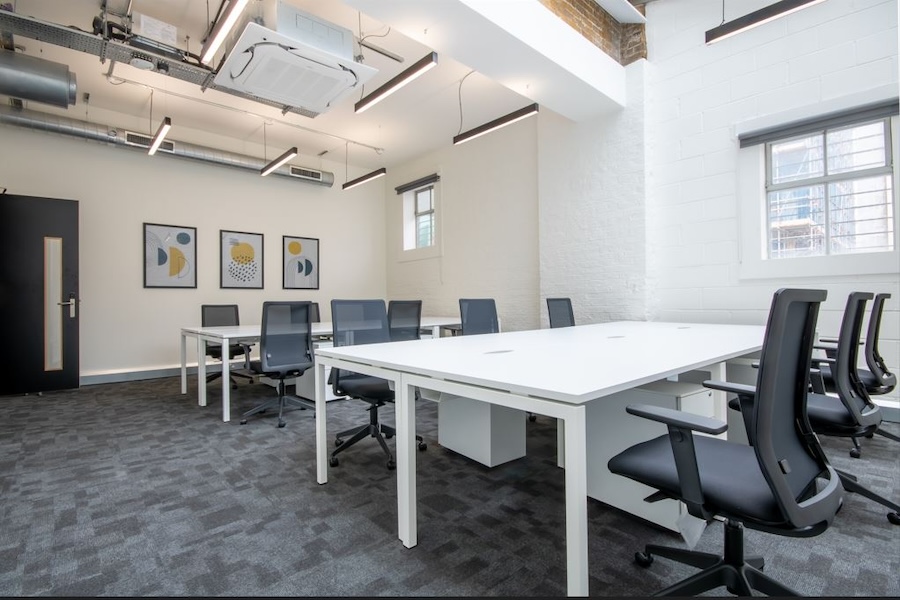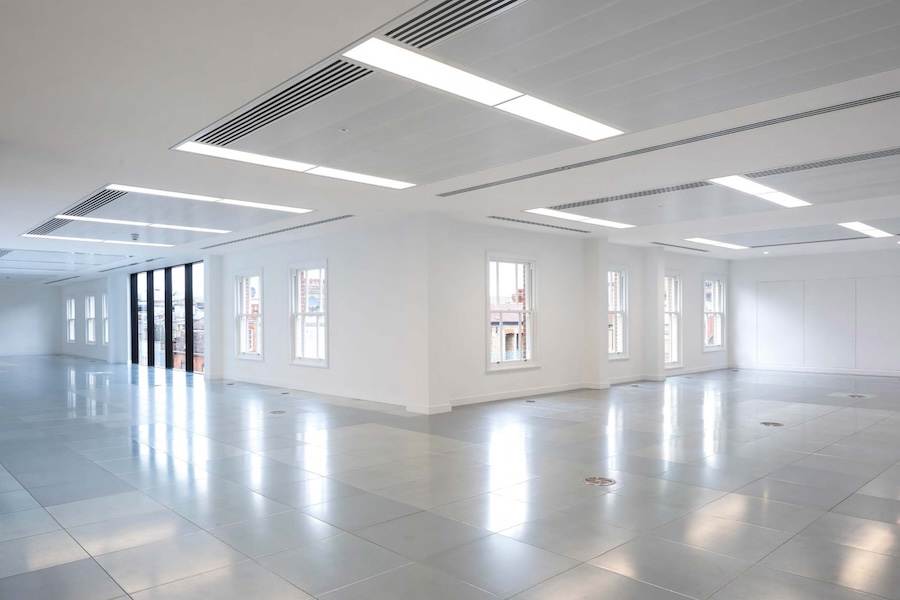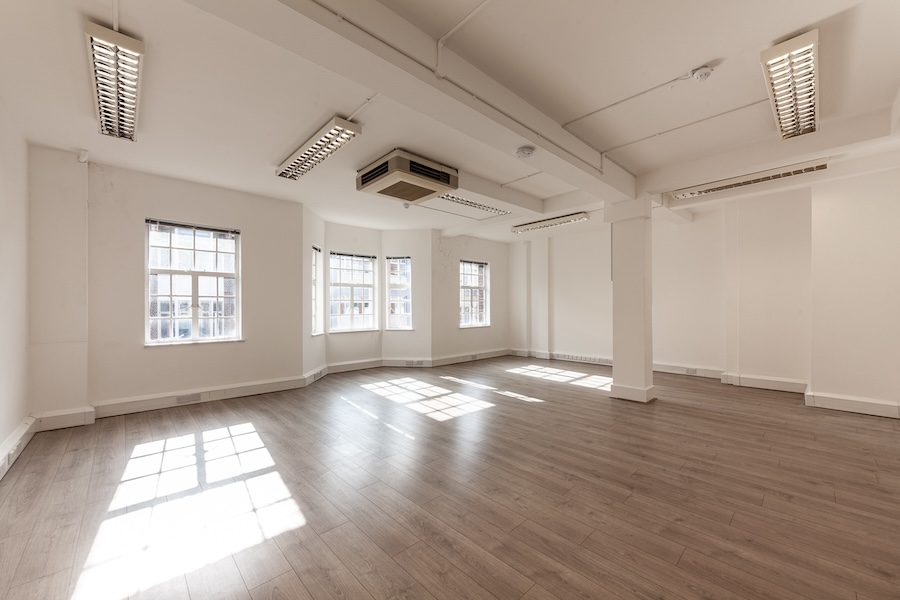The office market is full of choices. From virtual offices to coworking desks, plenty of different office space solutions are available for the taking.
But for businesses searching for an HQ — a permanent office space to call home — the three most common options are: Serviced Offices, Managed Offices, and Leased Offices.
While these offices indeed share some similarities, there are stark differences that will significantly impact your business. So, taking the time to choose the right office space is paramount.
But don’t worry, Hubble is here to do an office type comparison for you. Below, we outline the core differences between serviced, managed, and leased offices so you can choose the right one.
- What are serviced offices?
- What are managed offices?
- What are leased offices?
- What are the key differences?
- Choosing the right office type for your business
- How Hubble can help
What are serviced offices?
So, first things first. What is serviced office space?
Serviced offices are private office spaces or executive suites set up and ready to go from the day you move in.
This means the workspace provider takes care of all the building’s utilities, bills, and day-to-day maintenance. We’re talking repairs, cabling, stock… anything that helps a building run smoothly, it’s covered.

While you get your own private office equipped with desks and chairs, your team can also access the building’s facilities — such as meeting rooms, breakout space, and gyms — free of charge.
Costs are simplified into one all-inclusive monthly fee. Contracts usually start from 3 months to a year, but some serviced office rentals — like part-time offices — offer monthly rolling contracts.
And with plenty of serviced office space in London (and beyond!), it’s no surprise they’re among the most popular flexible workspaces today.
What are the advantages and disadvantages of serviced offices?
Serviced office solutions come with plenty of benefits, as well as some potential drawbacks to consider. As with implementing any business decision, it’s important to weigh the pros and cons:
| Serviced Office Pros | Serviced Office Cons |
| Ease of move-in Since serviced offices are ready-to-go, it’s quicker to move in. There’s less paperwork, so you can move in immediately if you want. You simply turn up, plug in your IT equipment, and start working! | Limited branding opportunities Customisation is limited in serviced offices. Except for removable versions of your company logo on doors and windows, you can’t paint the walls or go all out on lighting design to reflect your branding. |
Greater flexibility Serviced office contracts are much shorter, offering greater flexibility for companies who need agility — whether that’s downsizing, upsizing, or ditching the office altogether. | Higher cost per square foot With a serviced office rental, you pay a slight premium on rent in exchange for all-inclusive fees and amenities and increased flexibility. |
| Cash flow Serviced offices’ all-inclusive pricing means budgeting comes easy. With fixed rates and no surprise bills, you have greater control over cash flow. | Extras may be expensive If you need additional amenities — like an exclusive meeting room solely for your business use — you may pay a premium compared to an in-built meeting area. |
Where can I find a serviced office near me?
Hubble’s flexible workspace platform has over 22,000 offices across 1,800 buildings across the UK.
London is a hotspot for serviced offices. You can easily explore the costs of flexible office space in different areas of London with our London Office Rent Guides 2024. Download your copy now!

What is a managed office?
Now, what’s the definition of a “managed office”?
At a glance, a managed office is similar to a serviced office. They both provide a flexible workspace with all-inclusive fees and facilities, in which a separate company manages.
But the key difference is that a managed office requires greater input from the tenant.
Think of a managed office like a “blank canvas” that needs to be filled. You, the tenant, must establish what you need — from the number of desks and chairs to the type of floor finishes.

From there, the workspace provider can deliver exactly what’s needed to transform the managed office into a custom-built workspace.
And since more work has gone into creating a bespoke work setup, managed office contracts usually start at 12 months. But instead of paying per desk, you pay for the space you occupy.
What are the advantages and disadvantages of managed offices?
Again, managed office solutions come with plenty of benefits and potential drawbacks to consider. Before you sign the contract, it’s important to weigh up the pros and cons to managed offices:
| Managed Office Pros | Managed Office Cons |
| More exclusivity Exclusive to your company, a managed space ensures you don’t have to share meeting rooms or breakout spaces, making it an ideal office solution for businesses that frequently host clients. | Time Unlike serviced offices, renting a managed office involves a longer waiting period due to the necessary fit-out period. |
| Greater control over cash flow Similar to serviced offices, managed office rent is paid as one all-inclusive monthly fee, offering greater control over cash flow and simplifying budgeting. | Cost (in some ways) Compared to leased offices, a managed office may end up being more expensive as you’ll pay a slight premium for the flexibility and bespoke nature of the fit out. |
| Less daunting Managed offices are less intimidating for businesses seeking traditional office space. With lower deposits and fit-out costs spread over the tenancy, they offer a simpler option compared to leased offices. | Decreased agility Compared to serviced offices (where you can terminate your contract at a month’s notice), you’ll have to pay an exit fee if you want to terminate your contract early. |
How do I find a managed office near me?
Hubble’s flexible workspace platform hosts a wide range of bespoke, managed offices from top workspace providers, such as Knowlemore and Kitt.
Our expert advisors can help you find a managed office free of charge, providing recommendations, organising viewings, and negotiating the best rate.
What are leased offices?
So, what’s the definition of “leased offices”?
These offices are about as traditional as it gets. Think of them as a step up from a managed office.
A leased office is one that businesses rent directly from the building’s landlord. This is done on a price per square foot basis. To do this, a substantial deposit is required upfront.
You hold the keys to the kingdom, so to speak. You’re unlikely to work within the constraints of a third party, and you have a lot more freedom to design and build the space exactly to your liking.

There are usually two different types of leasehold agreements: short-form and long-term leases.
Long-form leases are ideal for businesses that are confident about their future. Here, you’ll commit to a space for five to ten years and require legal advice when drawing up the contract.
On the other hand, short-form leases act as a flexible alternative, and terms can start anywhere from 18 months to three years.
But in most cases, leased offices require substantial time and financial investment to set up. No furniture, equipment, or utilities are included in the contract. So, the responsibility and control are in your hands to get these sorted.
And while leased contracts are more complex than a license (an agreement allowing you to rent flexible office space), businesses get to enjoy greater autonomy over the space they occupy.
What are the pros and cons of leased offices?
Of course, leased office solutions have benefits and potential drawbacks. Before you recruit legal advice and sign the contract, it’s important to weigh up the pros and cons:
| Leased Office Pros | Leased Office Cons |
| More cost-effective Although a large deposit and initial costs are required, the average costs over time are often far lower than those of serviced and managed offices. | Higher upfront costs Leased spaces tend to be more expensive to set up but are often more cost-effective once established. |
| Greater legal protection Leased contracts offer both parties greater security and termination rights since the agreement cannot be terminated as quickly as a licence agreement. | Less agility Longer lease durations limit a company’s ability to swiftly adapt to meet business needs or external influences, whether it’s scaling down, expanding, or moving. |
| Personal branding Typically, leased spaces are delivered in CAT A condition, meaning tenants are in total control over the fit out, costs, and internal culture. | Longer move-in time Leased contracts typically take 3 to 6 months from commencement to completion, whereas serviced office agreements can take 24 hours. |
How do I find a leased office space near me?
Hubble provides support for those seeking leased office space.
Our in-house property experts offer guidance on finding a leased office, including strategy advice, sourcing tailored options, and negotiating the best deal for you.
What are the key differences?
| Serviced Offices | Managed Offices | Leased Offices |
| Minimum commitment One month. | Minimum commitment Typically one to three years. | Minimum commitment Typically five years. |
| Cost You’ll pay a slight premium on serviced office rent compared to managed offices in exchange for flexibility, all-inclusive fees and no fit-out costs. | Cost Managed offices have lower initial costs than leased ones. However, they can become pricier in the long run due to added premiums for flexibility, office management, and custom fit-outs. | Cost Leased spaces tend to be more expensive due to the bespoke fit-out, deposits, and legal fees, but they are often more cost-effective once established. |
| Customisation Limited ability to brand the space. | Customisation Ability to brand the space. | Customisation Total control over branding the space. |
| What’s included? Utilities, maintenance, and the building’s wider facilities. | What’s included? Utilities, maintenance, and the building’s wider facilities. | What’s included? No additional facilities are included in your rent. |
| Move-in time Serviced office rental allows you to move in straight away. | Move-in time The move-in time for managed office rental takes a little longer, depending on the fit-out period. | Move-in time Leased transactions usually take three to six months to complete. |

Choosing the right office type for your business
To ensure your workspace strategy pays off, it’s crucial to carefully select the type of office that best suits your business.
While Hubble’s expert advisors are available for guidance, here are some initial points to consider:
Should I rent a serviced office?

Before the pandemic, serviced offices mainly catered for young startups with high growth forecasts or those who don’t necessarily know what the future holds.
However, serviced office rentals are just as appealing for scale-ups, SMEs, and corporates. When you’re growing fast or fluctuating in size, the last thing you’ll want is to run out of space or pay for “empty desks“.
The flexibility of a serviced office solution allows companies to “pay as they grow” (or downsize!), so you only ever pay for the space you use.
This is particularly useful for SMEs and corporations needing overflow space for temporary or subsidiary teams or innovation hubs for new ventures.
Should I rent a managed office?

But while serviced offices are great for their facilities and flexibility, many businesses may feel it’s essential to have an office space that feels more like their own.
If this sounds like you, a managed office solution may be ideal.
A managed office is typically ideal for established small to medium-sized businesses seeking a long-term arrangement that offers customisation and branding — without subsidising facilities.
When it comes to flexibility, managed offices provide an excellent middle ground between serviced office options and long-term leases. The average contract length for a managed office is typically between 1-3 years, making this a more suitable choice for scaleup businesses and SMEs.
So, if you want to brand your office without hassle, upfront costs, and longer contracts, a managed office is for you.
Should I rent a leased office?

If you’re keen to take customisation to the next level — such as having custom-made sit-stand desks, ultra-fast broadband for your company’s servers, or your own meeting-booking system with iPads on the doors — a leased office might be the right solution for you.
Leased offices tend to suit large and enterprise businesses seeking private, customised spaces with a healthy budget to match.
They are able to predict their headcount and feel comfortable committing to a space for a fixed amount of time.
Still struggling to work out which office solution might work best for your business? This easy-to-follow flowchart may be your answer — cutting out the jargon and helping you understand which office type is right for your business.

Find a flexible office in London (and beyond) with Hubble
Hubble helps thousands of businesses find workspace that their teams love every year. Whether you’re seeking a traditional office or a more flexible solution, we’ll assist you every step of the way.
Why opt for Hubble?
- Expert guidance – Our workspace specialists oversee the entire process of finding your new office, so you don’t have to.
- 100% market coverage – With Hubble, you gain access to every available workspace in the flexible office market. Simplify your search by exploring all options in one place.
- Significant savings – Benefit from average discounts of 15% as our experts negotiate the best prices on your behalf.